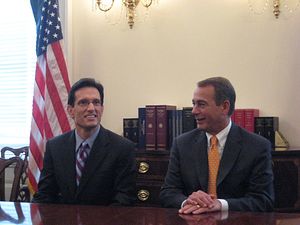There is a growing sense in the United States that when voters go to the polls this November, the Republican Party will win enough Senate seats to control both houses of Congress. This would potentially introduce more gridlock into an already dysfunctional American political system.
But it needn’t be all doom and gloom for U.S. foreign policy, including in the Asia-Pacific. In fact, the Republicans wrestling control of the Senate from the Democrats this November could be a boon for the U.S. Asia pivot. This is true for at least three reasons.
First, with little prospect of getting any of his domestic agenda through Congress, President Barack Obama will naturally focus his attention on foreign affairs. Presidents in general have a tendency to focus more attention on foreign policy during their second term, and this effect is magnified if the other party controls the legislature. And for good reason: U.S. presidents have far more latitude to take unilateral action in the realm of foreign affairs than in domestic policy. Additionally, the 2016 presidential election will consume much of the country’s media’s attention on domestic matters. It’s only when acting on the world stage that the president will still be able to stand taller in the media’s eyes than the candidates running to for legislative office.
Second, should the Democrats get pummeled in the midterm elections this year, President Obama is likely to make some personnel changes in the White House and cabinet. For instance, after the Republican Party incurred losses in the 2006 midterms, then-President George W. Bush quickly moved to replace Defense Secretary Donald Rumsfeld with the less partisan (at least in that era) Robert Gates. Obama followed suit by making key personnel changes after the Democrats “shellacking” in the 2010 midterm elections.
Should the Democrats face a similar fate in the 2014 midterm elections, Obama is also likely to make notable personnel changes. Other aides, particular former Clinton aides, are likely to leave the administration early in order to start vying for spots on Hillary Clinton’s presumed presidential campaign. Many of these changes are likely to be with domestic advisors given that domestic issues are certain to decide this year’s elections. Even so, many nominally domestic positions—such as Treasury and Commerce Secretary—have important implications for U.S. policy in Asia. Moreover, some of the post-election changes are likely be foreign policy and defense positions, which bodes well for Asia given the appalling lack of Asia expertise among Obama’s current senior advisors.
But the most important way a Republican victory in November will help the Asia Pivot is that the GOP in Congress are actually more favorable to the pivot than are members of Obama’s own party. For example, Congressional opposition to granting President Trade Promotional Authority — which is key to getting the Trans-Pacific Partnership ratified — is largely from Democratic legislators. Similarly, it is the Democrats who are largely in favor of the defense budget cuts that threaten to undermine America’s military posture in Asia.
If Republicans do prevail in November, President Obama will naturally want to find ways to bridge the very wide partisan gap between them. Asia offers the perfect issue area to begin reaching across the aisle.
The Republicans would have every incentive to reciprocate the President’s outreach. After all, by giving them control of the entire Legislative Branch, American voters will be expecting some results from the GOP before they would be ostensibly be ready to elect them to the White House in 2016. A Republican failure to achieve anything between 2014 and 2016 would risk putting the GOP in the same dilemma they faced in the 1996 and 2012 presidential elections. Working with the president to pass the TPP and strengthen America’s military’s posture in Asia would be ideal ways for the GOP to deliver results without violating their principles.
Thus, while the president will work tirelessly between now and November to help the Democrats retain the Senate, he should also prepare for failure by having a major outreach initiative to Congressional Republicans ready on day one. This initiative should be Asia-centric.
































